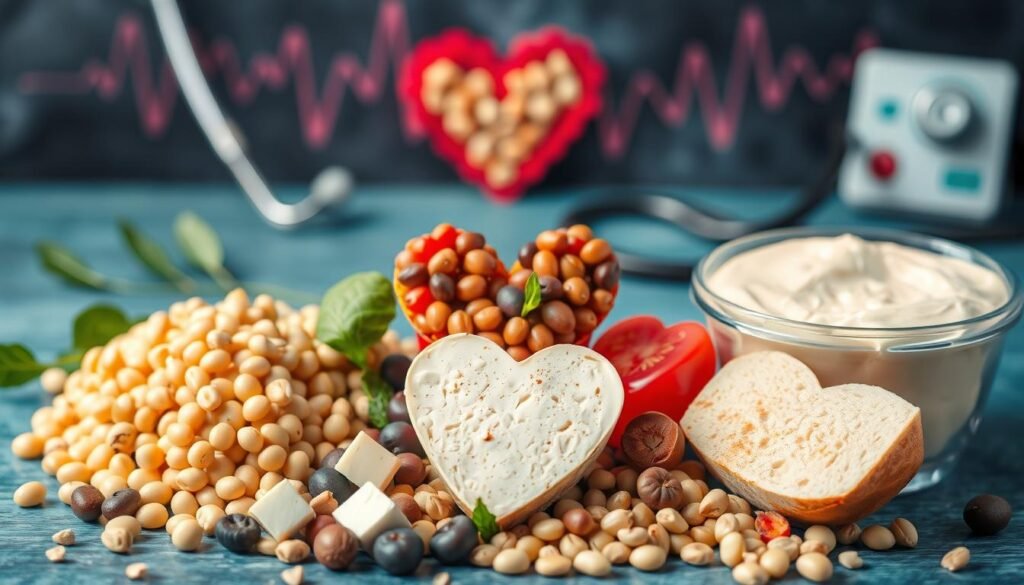Did you know that adding soy foods to your diet can cut LDL (“bad”) cholesterol by about 3%? This shows how crucial soy protein is for a healthy heart. As more people choose plant-based diets, knowing how soy protein affects cholesterol is key. Eating foods rich in soy helps control cholesterol levels. This also brings other benefits for heart health.
Soy is free from cholesterol and has low saturated fat. This makes it a great choice instead of animal proteins like chicken and beef. Soy products not only help reduce cholesterol but also offer protein, fiber, and omega-3s. However, it’s wise to add soy to your diet bit by bit. This helps check for any digestive issues or allergies.
To manage cholesterol levels well, eat a variety of foods. Include fruits, vegetables, nuts, seeds, whole grains, and beans in your diet. Learn more about diet and cholesterol at this resource.
Key Takeaways
- Soy protein may lower LDL cholesterol by about 3%.
- Soy is naturally cholesterol-free and low in saturated fat.
- It serves as a nutritious alternative to animal proteins.
- Moderation and variety in diet are essential for maintaining heart health.
- Gradually incorporating soy can help identify digestive sensitivities.
- Consulting a healthcare provider is advisable for tailored dietary choices.
Understanding Cholesterol: The Basics
Cholesterol is a waxy substance found in our cells and blood. It plays a key role in making hormones, vitamin D, and acids for digesting fat. Knowing about different cholesterol types is important for our heart.
The main cholesterol types are Low-Density Lipoprotein (LDL) and High-Density Lipoprotein (HDL). LDL is often called “bad” cholesterol because it can clog arteries. Meanwhile, HDL is “good” because it helps remove cholesterol from arteries to the liver.
Having a good balance between LDL and HDL is crucial for heart health. Too much LDL can cause your arteries to narrow. This increases the risk of heart disease and stroke. Eating right and living healthy can keep your heart strong.
It’s smart to keep an eye on your cholesterol levels. For more tips, check out strategies for managing cholesterol. It has information on keeping your cholesterol in check.
The Importance of LDL and HDL Cholesterol
It’s vital to know the roles of LDL and HDL cholesterol for heart health. LDL, or “bad cholesterol,” leads to plaque buildup in arteries, raising the risk of heart problems. HDL cholesterol, the “good” kind, helps remove LDL from the blood, making arteries healthier and lowering heart disease risk.
Cholesterol’s role in our health is key. For good health, your total cholesterol should be around 150 mg/dL. LDL should be close to 100 mg/dL, and HDL should be at least 40 mg/dL for men and 50 mg/dL for women. Hitting these targets can cut down on heart disease chances.
Eating soy products can lower LDL cholesterol. Research shows soy proteins reduce LDL and are as good as some medications. Some soy types also help better manage cholesterol and LDL, fighting off heart disease.
Diet choices affect cholesterol levels a lot. Including soy in your diet has been linked to less LDL cholesterol, highlighting the importance of soy for heart health. Keeping LDL and HDL cholesterol at healthy levels improves heart health and life quality.
What is Soy Protein?
Soy protein comes from soybeans and is full of health benefits. It’s a great choice for anyone looking for plant-based proteins. You can find soy protein in foods like tofu, soy milk, edamame, and tempeh. It’s packed with essential amino acids, fiber, vitamins, and minerals.
One key advantage of soy protein is its ability to cut down LDL cholesterol. Studies show it can reduce LDL cholesterol by about 3%. This is great since soy protein doesn’t have cholesterol and is low in saturated fat.
Soy protein can also take the place of high-saturated fat proteins, helping heart health. By eating soy protein instead of animal protein sometimes, you’re helping your heart. As soy foods become more popular, it’s clear they’re good for heart health.
Soy protein is important for plant-based diets. Anyone caring about heart health should try to eat more soy protein sources. To understand how soy protein helps lower cholesterol, click here.
Soy Protein and Cholesterol: Impact on Heart Health
Soy protein is a key player in improving heart health. It can lower cholesterol levels, especially LDL cholesterol, when it replaces high-fat animal proteins in your diet. By doing so, LDL cholesterol drops by about 3% to 4%. This helps create a better cholesterol balance.
How Soy Protein Lowers LDL Cholesterol
Research proves that eating soy protein reduces LDL cholesterol. Specific soy proteins, like B-conglycinin, cut down cholesterol production. They control a crucial enzyme called HMGCR. Also, peptides from soybean flours have effects like statins. They lower lipids, helping those who prefer natural methods to manage cholesterol. Soy protein is indeed a strong alternative for better heart health.
The Role of Soy Isoflavones in Cardiovascular Health
Soy isoflavones act like estrogen and boost soy protein’s heart benefits. They make your cholesterol balance healthier and might lower heart disease risk. Studies show eating whole soy foods links to less cardiovascular disease. More research is needed on soy isoflavones’ effects on menopause and breast cancer. Yet, their importance for heart health is clear.

Incorporating Soy into Your Diet
Adding soy to your daily meals offers both taste and nutrition. There are many heart-healthy soy products to choose from. This makes it easy to enjoy the perks of soy.
Delicious Ways to Add Soy to Your Meals
There are many ways to bring soy into your diet. Here are some tasty options:
- Tofu: Boost protein in stir-fries, salads, or smoothies with tofu.
- Edamame: Steamed edamame is a nutritious, satisfying snack.
- Soy Milk: Use soy milk in oatmeal or as a dairy alternative.
- Tempeh: Grilled tempeh makes sandwiches and bowls more exciting.
- Miso Soup: Miso soup starts the day with rich flavors and health perks.
Recommended Soy Products for Heart Health
Selecting heart-healthy soy items can boost meals and heart health. Here are some top picks:
| Product | Protein Content (grams per serving) | Notes |
|---|---|---|
| Firm Tofu | 20 | Great in stir-fries and soups. |
| Soy Milk | 7 | Look for fortified versions for extra nutrients. |
| Tempeh | 16 | It has probiotics – amazing in sandwiches. |
| Textured Soy Protein | 12 | Ideal for meat substitutes. |
| Canned Soybeans | 13 | Simple to add to salads or stews. |
Using these soy products enhances meals and heart health. They come in various flavors and textures. So, anyone can find something they like.
The Benefits of Plant-Based Proteins
More Americans are choosing plant-based proteins for better health. In 2020, 28% said they ate more plant proteins than in 2019. This change shows people know plant proteins are good for them. They have less saturated fat than meat.
The American Heart Association says eating less meat cuts risk of heart disease, high blood pressure, and diabetes. Plant proteins are packed with nutrients and boost gut health. They also have fiber which helps manage blood sugar and hunger.
Dr. Hunnes, a nutrition expert, believes if people get enough calories, they will likely get enough protein from plants. Eating various plant proteins ensures getting all essential amino acids. This benefits health and makes meals interesting while helping the heart.

Eating plants instead of meat can lower bad cholesterol. Studies show vegetarians often have lower blood pressure and cholesterol than meat-eaters. This proves plant proteins can help prevent heart problems.
Adding plant-based proteins to your diet is tasty and healthy. It’s good for your body and the planet. Plant proteins are a smart choice for improving your health.
Comparative Analysis: Soy vs. Animal Proteins
Finding the best way to support heart health matters. It’s key to know how soy and animal proteins differ. Studies reveal that soy foods can cut down on saturated fats, enhancing health. These insights help us choose wisely for a healthier life.
Reducing Saturated Fat with Soy Foods
Soy proteins in your diet can lower cholesterol. Studies show swapping animal protein for soy can reduce bad cholesterol (LDL) by 0.14 mmol/L. This is key for lessening heart disease risks and boosting heart wellness.
USDA guidelines suggest getting 10 to 35% of calories from protein, with most people currently at 16%. Opting for soy over meat aids in managing saturated fat without compromising protein needs.
Choosing soy over animal protein reduces saturated fats and is linked to lower heart disease and diabetes risks. Evidence is growing that plant proteins offer better health outcomes than animal products. For more on cholesterol and its effects, visit this guideline on reading cholesterol test results.
Scientific Studies on Soy and Heart Health
Recent research shows that soy is good for heart health. Scientists found that eating soy foods regularly might lower heart disease risk. This is especially true for younger and postmenopausal women. They noticed significant cardiovascular benefits from soy intake.
Research Findings on Soy Foods and Heart Disease
Many studies link soy consumption to better heart health. One analysis found a notable drop in total cholesterol by about 9.84 mg/dL from eating soy products. Also, “bad” LDL cholesterol levels went down by 6.94 mg/dL. This reduction could greatly lower the risk of heart disease.
Soy eating led to fewer triglycerides in the blood, dropping by 24.73 mg/dL. It also lowered C-reactive protein, a sign of inflammation linked to heart disease. However, there were no changes in “good” HDL cholesterol, blood sugar, or blood pressure levels among those studied.
Some groups did see benefits in their blood sugar and blood pressure. People with high initial blood sugar or high blood pressure improved. In 1999, the FDA accepted soy’s heart benefits, aligning with other countries’ views.

Potential Risks and Considerations with Soy Consumption
The growing interest in soy has brought its health risks into focus. By learning about these risks of soy, you can make better food choices. Soy is great in many ways, but we must be careful. This is because of issues like soy allergies and digestion problems.
Digestive Issues and Allergies
Some people get bloated or have stomach aches from soy. This happens because soybeans have things called oligosaccharides. But, this problem is less common with processed soy foods since they have less of these compounds.
Soy allergies are real. They can cause everything from a slight tummy upset to serious health issues. It’s smart to talk to a doctor to get advice that fits you.
Hormonal Effects of Soy: What You Should Know
Soy and its hormonal effects spark a lot of debate. It’s because soy has isoflavones that act like estrogen. There’s some evidence that they help women during menopause. Yet, there are worries about its effect on men and the body’s hormone levels. It’s important to enjoy soy in moderation.
Knowing these facts might help people decide if soy is right for them. Continued research will likely reveal even more about soy’s health impacts. For more on soy and health, check out WebMD’s overview.
Conclusion
Adding soy protein to a healthy diet offers many benefits, especially for managing cholesterol. Studies show soy protein helps lower total cholesterol, bad (LDL) cholesterol, and triglycerides. It also helps raise good (HDL) cholesterol levels. Soy protein can lower LDL cholesterol by about 4.25 mg/dl and raise HDL by 0.77 mg/dl. This proves soy protein is great for heart health.
Analysis of 41 studies with over 1,700 people shows soy protein makes a balanced diet better for your heart. It’s important to combine soy with other healthy foods in your diet. Eating soy protein can improve your cholesterol and support a healthy heart lifestyle.
Eating different nutritious foods, including soy protein, helps a lot with managing cholesterol. Groups like Heart UK and the European Atherosclerosis Society say soy is key for heart health. This makes it clear: soy protein is important in a diet that’s good for your heart.